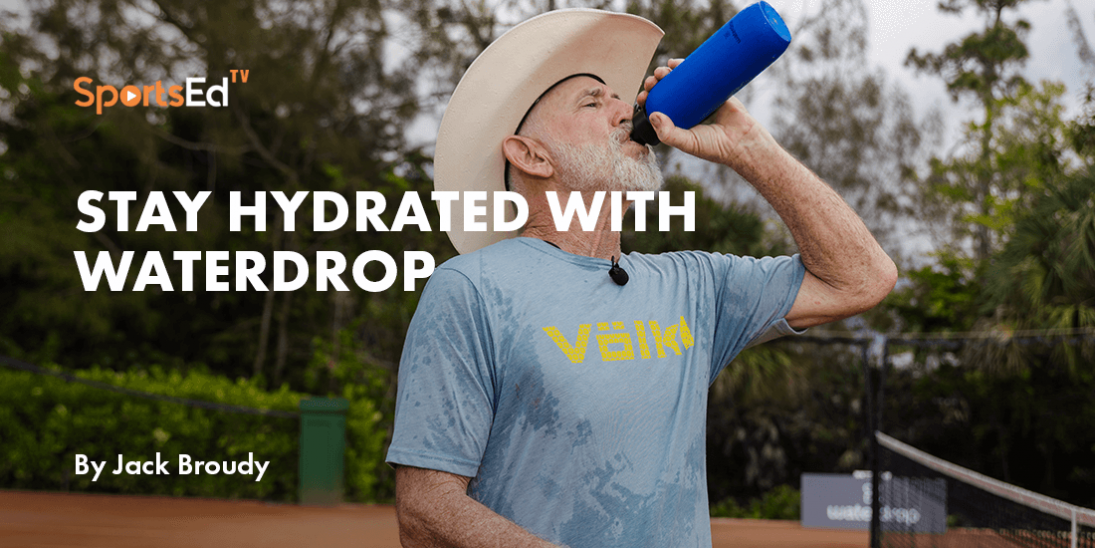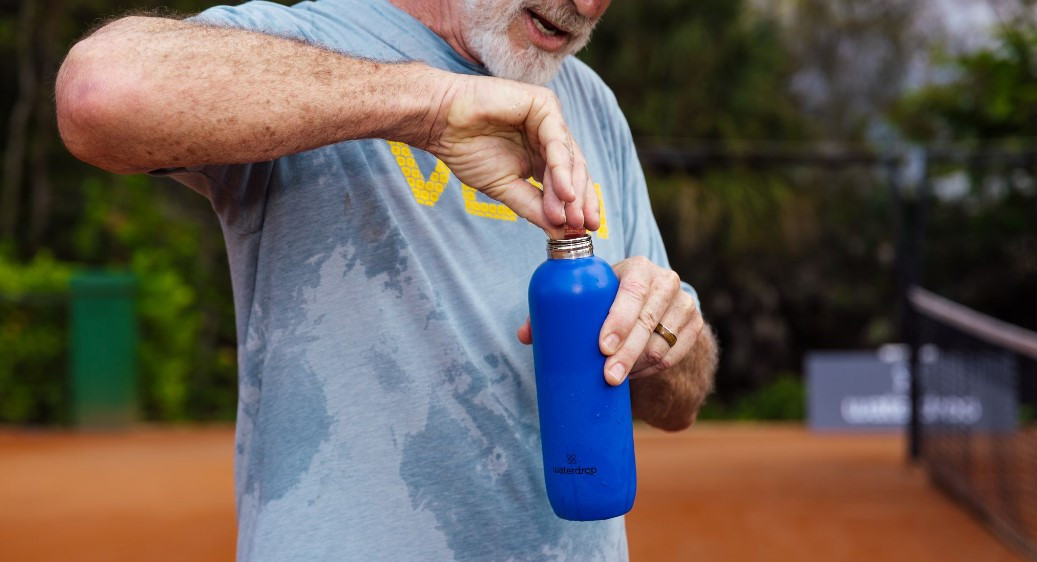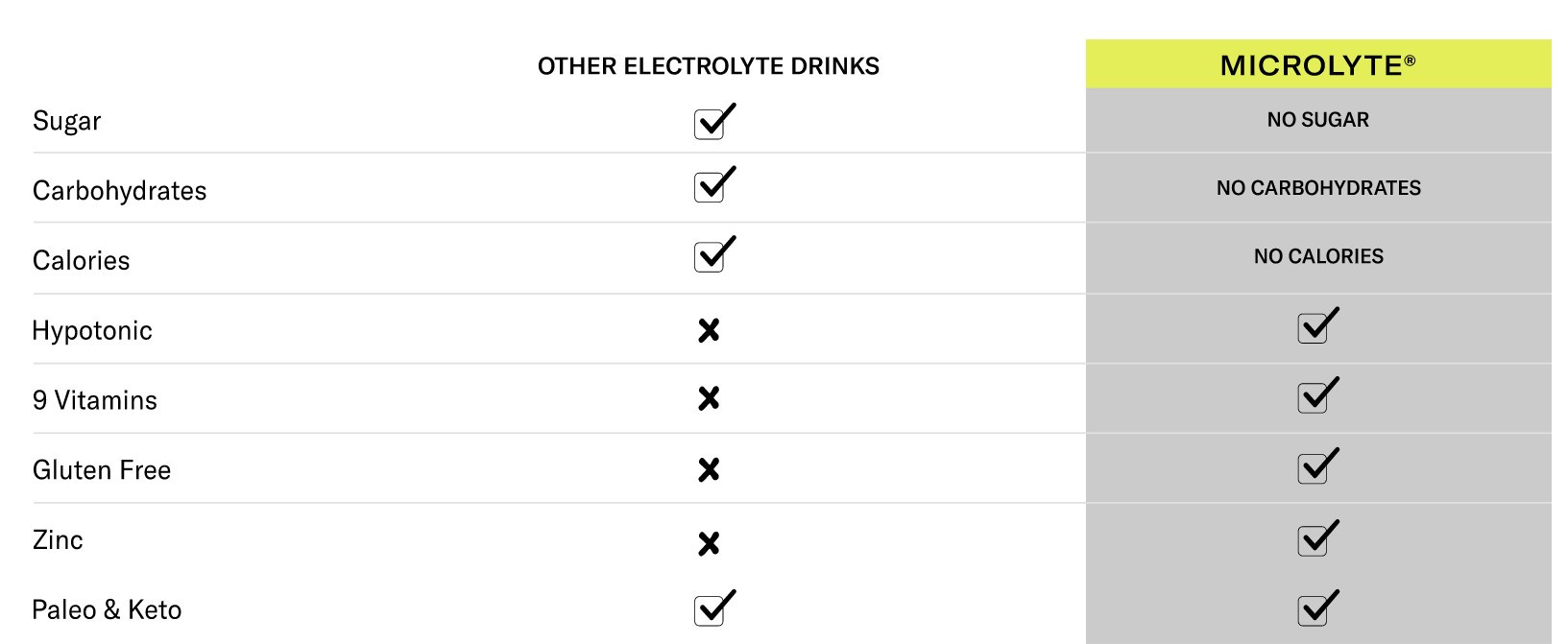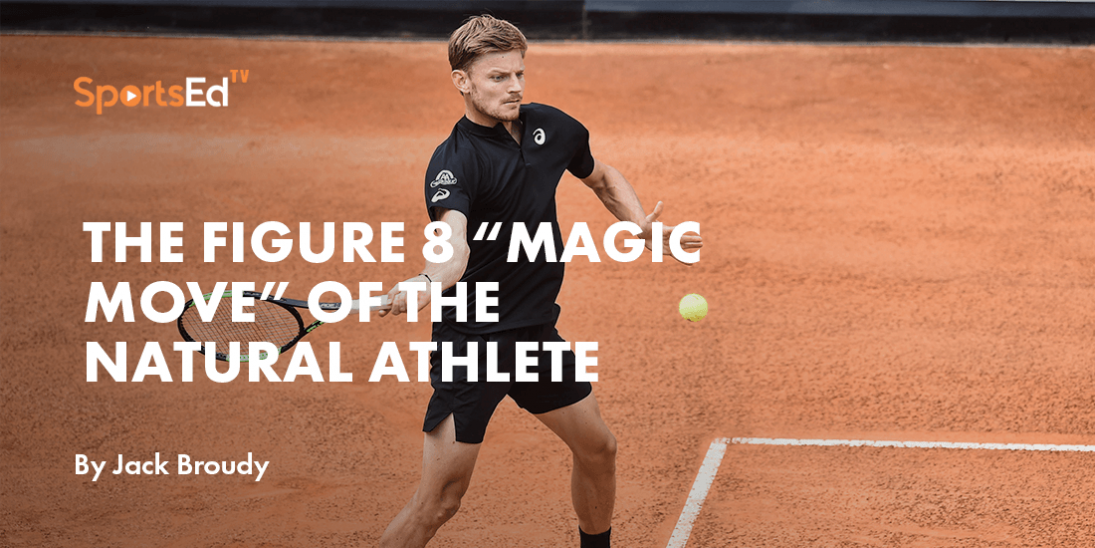Nutrition, Pickleball, Tennis
Welcome and thanks for visiting...

Hydration for Athletes: Tips for Optimal Performance and Recovery

Staying hydrated is essential for maintaining good health and optimal performance, especially for athletes. Proper hydration can help improve endurance, prevent cramping, and aid in recovery. Here are some tips to help you stay hydrated and perform at your best.
I have officially switched to Waterdrop sports drink - for hydration and recovery. It has a multitude of electrolytes, vitamins, and minerals. It also has no sugar and has a more subtle taste, which I prefer to sweet sports drinks. Plus, it’s convenient and easy to use.
Understand Your Body's Hydration Needs.
Hydration is incredibly important for tennis players as it affects their performance and overall health. Tennis is a physically demanding sport that requires a lot of movement, which can cause the body to lose fluids quickly. Here are some of the reasons why hydration is critical for tennis players:
- Maintaining body temperature: When you exercise, your body temperature rises, and sweating is the body's way of cooling itself down. If you're dehydrated, your body will have a harder time regulating your body temperature, leading to overheating and fatigue.
- Preventing cramps: Dehydration can cause muscle cramps, which can be painful and make it difficult to continue playing.
- Improving cognitive function: Dehydration can also affect your cognitive function, making concentrating and reacting quickly to the ball harder.
- Increasing endurance: Staying hydrated can help improve your endurance, allowing you to play for longer periods without feeling fatigued.
I have often felt drained and woozy on the court, whether in high altitude or hot and humid conditions. To ensure that tennis players are properly hydrated, they should drink water before, during, and after their matches or training sessions. It's also important to drink fluids containing electrolytes, as they are essential for proper hydration and muscle function. Tennis players should also pay attention to the color of their urine; if it's dark yellow or amber, they are likely dehydrated and should drink more fluids.
Replenish Electrolytes.
To elaborate a bit more on electrolytes, they are essential for athletes as they play a crucial role in many bodily functions, including regulating fluid balance, maintaining proper muscle and nerve function, and supporting cardiovascular health. During exercise, athletes lose fluids through sweating, which can lead to an imbalance of electrolytes in the body. Here are some of the reasons why electrolytes are important for athletes:
- Regulating fluid balance: Electrolytes, such as sodium, potassium, and chloride, help regulate fluid balance in the body, which is crucial for proper hydration.
- Supporting muscle function: Electrolytes, including contraction and relaxation, are important for proper muscle function. Sodium and potassium, in particular, are critical for muscle function, as they help transmit nerve impulses to the muscles.
- Improving endurance: Studies have shown that maintaining proper electrolyte balance can help improve endurance during exercise, allowing athletes to perform at a higher level for longer periods.
- Reducing cramping: Imbalances in electrolytes can lead to muscle cramping, which can be painful and impact performance. By maintaining proper electrolyte balance, athletes can reduce the risk of cramping and muscle fatigue.

Post-Exercise Hydration and Recovery.
To maintain proper electrolyte balance, athletes should consume fluids that contain electrolytes, vitamins, and minerals, like Waterdrop sports drinks. It's also important to eat a balanced diet that includes foods rich in electrolytes, such as bananas (potassium), spinach (magnesium), and salted nuts (sodium). Athletes should also pay attention to their hydration levels and consume fluids before, during, and after exercise to help maintain proper electrolyte balance and support overall performance. Vitamins and minerals play a critical role in supporting the overall health and performance of athletes. Here are some of the reasons why vitamins and minerals are important for athletes:
- Supporting energy production: Many vitamins and minerals, including B vitamins, iron, and magnesium, are involved in energy production. By ensuring adequate intake of these nutrients, athletes can maintain optimal energy levels during exercise.
- Supporting muscle and bone health: Vitamins and minerals, such as calcium, vitamin D, and vitamin K, are important for bone health and can help prevent injuries. Adequate intake of these nutrients can also support muscle strength and function.
- Supporting immune function: Exercise can place stress on the immune system, making athletes more susceptible to illness. Vitamins A, C, E, and zinc are important for immune function and can help athletes recover more quickly from illness.
- Reducing inflammation: Intense exercise can cause inflammation in the body, which can lead to soreness and fatigue. Vitamins C and E, along with minerals such as selenium, are antioxidants that can help reduce inflammation and support recovery.
Finally, to ensure an adequate intake of vitamins and minerals, athletes should eat a balanced diet that includes a variety of fruits, vegetables, whole grains, lean protein, and healthy fats. Athletes may also benefit from taking a daily multivitamin/mineral supplement, especially if they have dietary restrictions or struggle to meet their nutrient needs through food alone. It's important for athletes to work with a registered dietitian to determine their specific nutrient needs based on their sport, training, and individual needs.
My personal experience with dehydration.
My most recent personal story with hydration or lack thereof explains why I felt it necessary to encourage others to hydrate properly with WaterDrop.
I went to Miami recently to work with and shoot some videos for SportsEdTV after not playing any tennis for the last five months. I should preface this with the fact that for the past year and a half, I’ve lived in the Denver area, far from San Diego, my last home for 46 years.
I thought the transition would be easy, going from a mile-high elevation to sea level. However, I did not take into account the heat and humidity. On the first day, I played with John Eagleton, who can play high-level tennis. No problem. After a few minutes, I felt my timing come back, and I started to hit a bit better.
The next day I was sure I’d be back to my old self. That next day, however, it got hotter and more humid. I was losing it. I was getting loopy and not in a good way. I thought I might pass out. My legs were wobbly, and my brain felt fried. John gave me this WaterDrop tablet, and it immediately got my recovery started. Within minutes after drinking, the water with the tablet quickly dissolved, and I could focus again and finish our hit.
Suffice it to say, I’m a believer. I always have the box of WaterDrop tablets in my racket bag and drink it every time I play - before, during, and after. It’s easy to drink because it’s not sweet. I love reading on the side of the box all the ingredients, vitamins, minerals, and electrolytes that I’m ingesting.
Summer is coming, which means lots of lessons, hits, and matches. I will be ready this season. I will stay hydrated.
As I’ve gotten older I realize that I can’t take hydration for granted or anything else. Now I feel ready and well-prepared. If players like Taylor Fritz and Novak Djokovic are using this product it’s probably a good idea I follow suit.
I have confidence now facing the long, hot summer.









